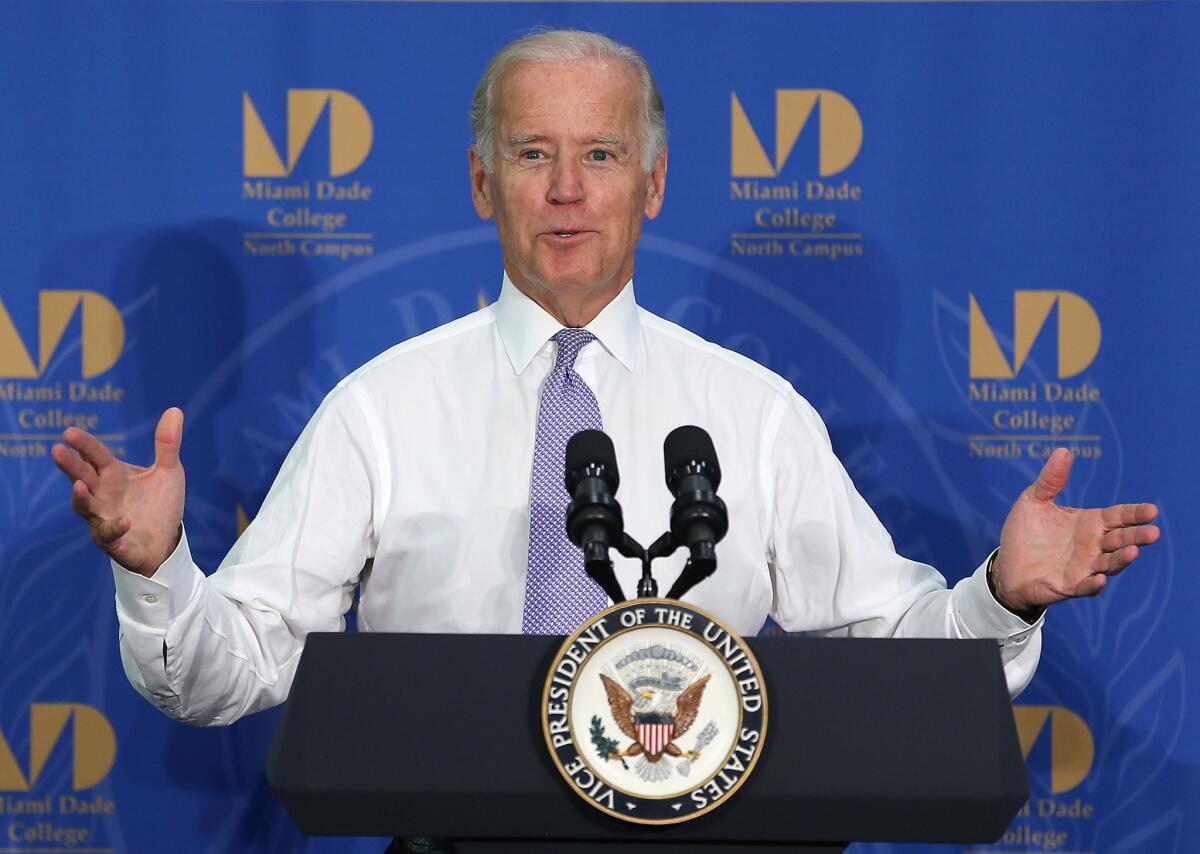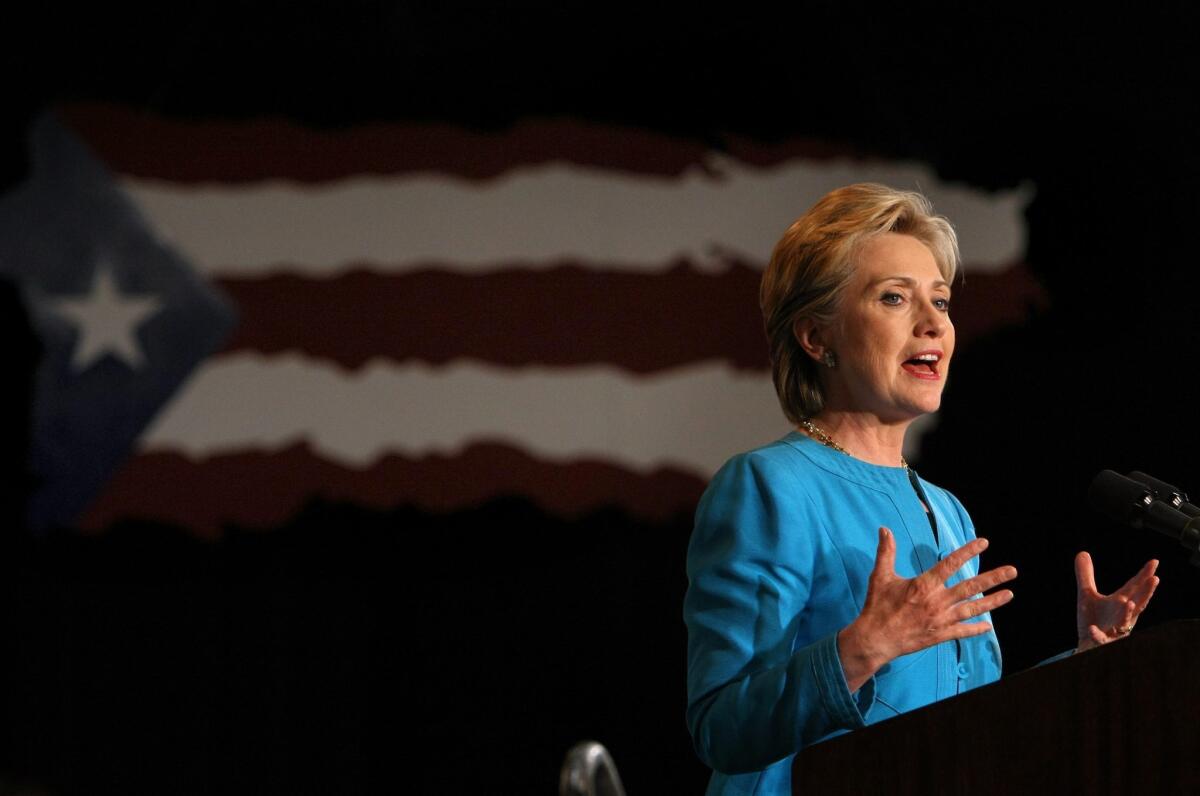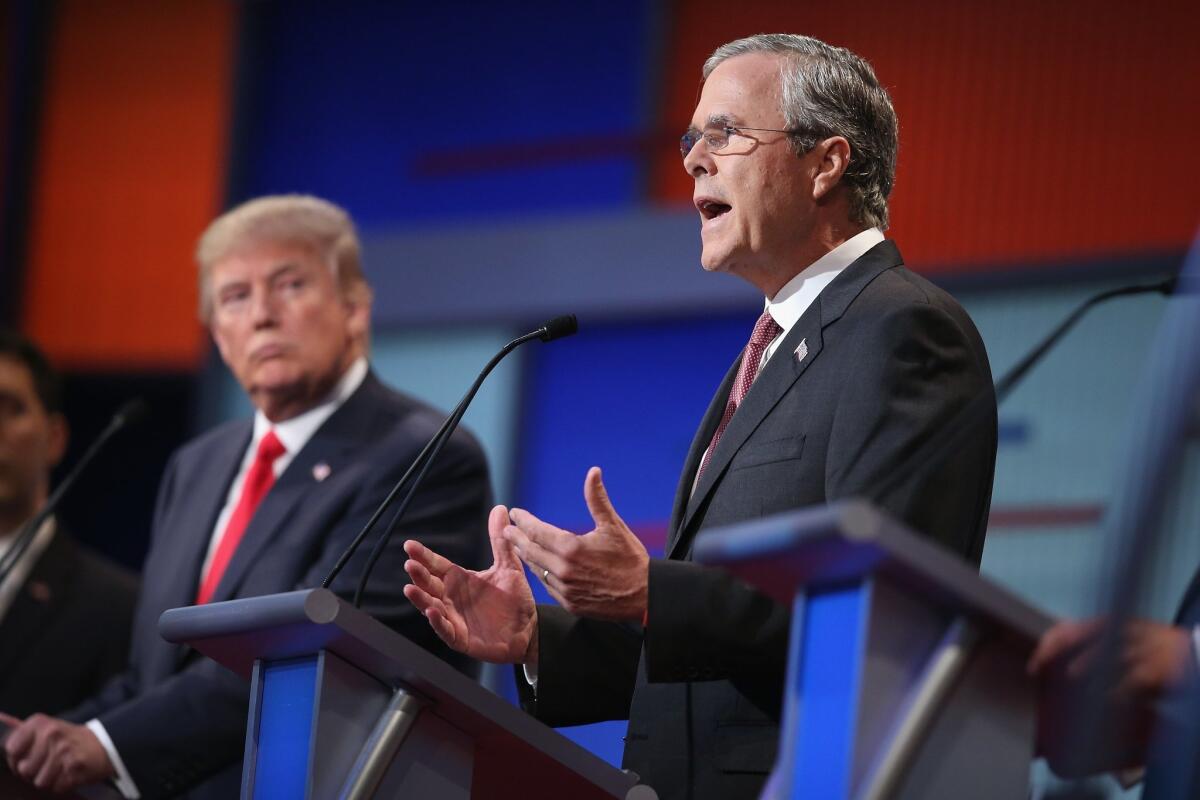Kim Davis becomes GOP campaign issue
By the numbers
Welcome to Trail Guide, your daily tour through the wilds of the 2016 presidential campaign. It's Friday, Sept. 4, and this is what we're watching:
- Mike Huckabee plans an "I'm With Kim" rally in support of jailed Kentucky clerk.
- Hillary Rodham Clinton apologizes, to a point, for the 'confusing' server issue.
- Clinton and Marco Rubio are both campaigning in Puerto Rico
- Joe Biden sounded torn and undecided as he discussed a possible White House bid late Thursday
- Trump struggled with a foreign policy pop quiz and he doesn't care
For Joe Biden, one decision might force another

MIAMI, FL - SEPTEMBER 02: U.S. Vice President Joe Biden speaks at the Miami Dade College on the importance of helping more Americans go to college September 2, 2015 in Miami, Florida. Biden spoke about the critical role that partnerships between community colleges and employers play in helping Americans obtain the skills they need to succeed in the workforce. (Photo by Joe Raedle/Getty Images) ** OUTS - ELSENT, FPG - OUTS * NM, PH, VA if sourced by CT, LA or MoD **
During a television interview a year ago, long before the presidential race had begun and before tragedy would strike his family again, Vice President Joe Biden made this observation about 2016.
"Everything I think I would have to do to be a viable candidate is the same exact thing I should be doing to be the best vice president I could possibly be," he said on the set of "The View."
This week certainly proved that, as Biden traveled to Florida on official administration business, but offered a glimpse of the strategy that might guide his candidacy if he decides to run.
But two questions stand in the way. One, Biden himself raised Thursday: Is his family ready for the grind of a campaign as they still grieve the loss of Beau Biden, the vice president's son and father of two? The other: Would Biden offer himself as an alternative to Hillary Rodham Clinton, or as the best replacement should her candidacy falter?
Some but not all GOP hopefuls come to Kim Davis' defense
Republicans have faced a difficult choice heading into the presidential election on the issue of same-sex marriage, as the view of the party's social conservative base increasingly separates from the broader electorate. But Kim Davis' willingness to be jailed rather than issue marriage licenses in her Kentucky county has offered those GOP hopefuls inclined to make a stand on the issue a chance to do so again -- and in most cases, with only the briefest mention of same-sex marriage at all.
Sen. Ted Cruz (R-Texas) called Davis' jail sentence a sign that "judicial lawlessness crossed into judicial tyranny, and asked: "Where is the call for President Obama to resign for ignoring and defying our immigration laws, our welfare reform laws, and even his own Obamacare?"
Former Pennsylvania Sen. Rick Santorum warned of how more "people of faith" faced similar penalties "if we do not make the necessary accommodations so people can not just worship but live out their faith in their lives."
Some are leaning in harder than others. Mike Huckabee, for instance, is organizing an "I'm With Kim" rally outside the Carter County Detention Center where Davis is being held.
"Having Kim Davis in federal custody removes all doubt of the criminalization of Christianity in our country. We must defend religious liberty and never surrender to judicial tyranny," the former Arkansas governor said.
Count Donald Trump, the current GOP front runner, among those who argue Davis has an obligation to honor the Supreme Court's decision that paved the way for same-sex marriage nationwide.
"You have to go with it. The decision has been made. And that is the law of the land," he told the hosts on MSNBC's "Morning Joe," though he also said: "I hate to see her being put in jail."
Jeb Bush, John Kasich and Carly Fiorina offered similar responses.
But Louisiana Gov. Bobby Jindal sent an e-mail to supporters focused on Trump, arguing he "turne[ed] his back on Christians."
"I will never abandon my commitment to protect our freedom so that I can get praise from the liberal media -- or suck up to Donald Trump," Jindal wrote. "Even really, really rich guys in Manhattan like him should oppose jailing Christians for their religious beliefs."
Hillary Clinton sorry for 'confusing' email issue. Is that enough?
Would Hillary Rodham Clinton like to apologize to voters for the past emailing practices that have so many of them questioning her trustworthiness?
Sort of.
"It wasn't the best choice," Clinton said during a 30-minute interview with journalist Andrea Mitchell on MSNBC Friday. "I certainly have said that. I will continue to say that."
But the only reason Clinton said she was sorry for her use of a email server in her home for government communications while secretary of State was because it has been "confusing to people and has raised a lot of questions, but there are answers to all these questions." About a third of the sitdown interview -- the longest Clinton has done since announcing her run in April -- was consumed by the kind of uncomfortable questions about her emailing practices the campaign had hoped would be past her by now.
But as it has become clear that the issue is not going away, Clinton is now confronting it with more public discussion. There will be many uneasy exchanges to come.
On Friday, Mitchell challenged Clinton's assertion that Colin Powell used email in much the same way when he was secretary of State. Mitchell asked how it was possible the secretary of State could have a government email address that even the agency's own information technology staff did not know she had. And then she asked how it was possible that none of Clinton's advisors warned her that the private email server was a monumentally bad idea.
"I was not thinking a lot [about email systems] when I got in," Clinton said. "There was so much work to be done. I didn't stop to think what kind of email system there would be."
The interview came a day after an aide who helped Clinton set up the private server told a congressional committee investigating her use of government email that he will be invoking his 5th Amendment protection against self-incrimination, refusing to answer the questions of the committee. Clinton has said repeatedly she will not be doing the same when it is her turn to testify late next month. She told Mitchell that the hearing, demanded by Republican lawmakers, is an opportunity for her to clarify the email issues "in front of the entire world."
Clinton said the troubles her campaign has faced over the summer in no way resemble her experience during the 2008 race, which she entered as a dominant front-runner but ultimately lost. "I don't feel that," she said. "I feel I have questions to answer. Which I will at every turn."
One topic Clinton seemed more eager to discuss was Donald Trump.
Asked about the attacks he has leveled against her and her staff, Clinton said: "He is great at innuendo and conspiracy theories and really defaming people." And she had more to say, suggesting "loose talk, threats, insults" are dangerous coming from a potential head of state. And more. "I think it is an unfortunate development in American politics that his campaign is all about who he is against," Clinton said, citing basketball great Kareem Abdul-Jabbar and Fox News journalist Megyn Kelly as examples of targets of Trump's attacks.
The interview was only the second Clinton has sat for with the national media since becoming a candidate. Next week, she will be a guest on "The Ellen DeGeneres Show."
Hillary Clinton: Private server 'wasn't the best choice'
The Times' Evan Halper is watching as Hillary Rodham Clinton sits down with NBC's Andrea Mitchell for just the second major national interview of the former secretary of State's presidential campaign. As expected, her use of a private email server as secretary was a major topic.
But Clinton also weighed in on the biggest story of the GOP primary campaign: Donald Trump.
Iowa, New Hampshire and ... Puerto Rico?

SAN JUAN, PUERTO RICO - JUNE 01: Democratic presidential hopeful U.S. Sen. Hillary Clinton (D-NY) speaks to supporters during her Puerto Rico primary night party June 1, 2008 in San Juan, Puerto Rico. Senator Clinton won the democratic Puerto Rico primary by a large margin over her rival U.S. Sen. Barack Obama (D-IL). (Photo by Justin Sullivan/Getty Images)
Puerto Rico has become perhaps the unlikeliest presidential primary battleground this year. And it likely has little to do with the delegates the territory will send to each party's nominating convention.
Already it's seen visits from Republican Jeb Bush and Democrat Martin O'Malley. Friday it hosts two leading contenders at the same time: Hillary Rodham Clinton and Marco Rubio.
Clinton holds a healthcare roundtable in San Juan this afternoon, where her campaign says she will hear about the challenges Puerto Ricans face and "the impact of the unequal treatment that Puerto Rico patients, doctors and hospitals suffer in federal healthcare reimbursement policies." She'll also discuss Puerto Rico's struggling economy and what Washington can do to support it.
Rubio's campaign, meanwhile, is billing his visit as almost a prize fight. "Marco vs. Hillary in Puerto Rico," a news release blared.
"Marco's generational approach to solving the challenges of the 21st century with conservative and innovative solutions will be a stark contrast to that of Hillary Clinton," the campaign said.
The larger battle here is one for the important Latino vote, particularly with many voters of Puerto Rican decent now scattered elsewhere in the U.S. — especially in Florida, which holds an important early primary and is, of course, one of the biggest prizes in November.
Advisors for Rubio, a fluent Spanish speaker, point out that he will hold a public rally rather than an invitation-only roundtable, a signal perhaps to GOP voters elsewhere of a major advantage he could have in a potential general election matchup.
But it is also true that while voters in Puerto Rico have no vote in the general election, they will hold primaries. And Clinton's camp need look only to 2008 for a reminder of how every vote can count.
Then, Clinton made multiple visits late in the campaign — including a day spent riding around the island on a flatbed truck in customary "caravana" style — in hopes of cutting into Barack Obama's delegate count and overall popular vote lead. She won the contest easily.
"We're not taking anything for granted," Clinton campaign manager Robby Mook said of the trip. "It's going to be an important trip for her in terms of organizing our supporters there. We look forward to kick-starting our efforts to win the vote on the island."
Jeb Bush goes on the attack against Trump. Will it pay off?

CLEVELAND, OH - AUGUST 06: Republican presidential candidate Donald Trump listens as Jeb Bush (R) fields a question during the first Republican presidential debate hosted by Fox News and Facebook at the Quicken Loans Arena on August 6, 2015 in Cleveland, Ohio. The top ten GOP candidates were selected to participate in the debate based on their rank in an average of the five most recent political polls. (Photo by Scott Olson/Getty Images) ** OUTS - ELSENT, FPG - OUTS * NM, PH, VA if sourced by CT, LA or MoD **
With his famous name, big financial backing and establishment cred, Jeb Bush was the anointed Republican front-runner as the 2016 presidential campaign got underway. But like everyone else in the field, he has been tossed aside this Summer of Trump, watching the Donald -- with his own famous name, his own financial backing and his own cred, among polled voters, at least -- claim the front-runner mantle from him.
And Trump, like a schoolyard bully with a favored target, has gone after Bush seemingly more than any other candidate of late, and often on a personal level. Over and over, he dismissively labels Bush "low-energy" and derides the super PAC money supporting Bush as beholding him to "special interests."
Bush has clearly decided to fight back. He's gone after the liberal parts of Trump's record. He's mocked Trump's germophobia. But will it pay off? The Times' Seema Mehta explores whether Bush can sustain the attacks, and what it will mean for his campaign now that he's vowed to take on the king of the moment on the campaign trail.
Biden on White House run: 'Can I do it?'
Vice President Joe Biden seemed to be kicking the tires on a potential campaign message over the last two days in Florida. But Thursday night, he sounded like a man still very much unsure of whether he would ever join the 2016 presidential race.
After delivering a lengthy foreign policy lecture at an Atlanta synagogue Thursday, Biden was asked directly what his latest thinking was on potentially running in the Democratic primary election. He told the audience, as he told Democratic Party officials last week, that the main factor was “whether my family and I have the emotional energy to run,” as they continued to mourn the loss of Biden's eldest son, Beau.
“Everybody talks about a lot of other factors: the other people in the race, and whether I can raise the money and whether I can put together an organization,” he said. “That's not the factor. The factor is, can I do it? Can my family undertake what is an arduous commitment that I would be proud to undertake under ordinary circumstances?”
“But the honest-to-God's answer is, I just don't know.”
Recalling the grieving that followed another searing tragedy at the start of his career, the 1972 vehicle accident that claimed the lives of his first wife and infant daughter, Biden said: “There's no way to put a timetable on that.”
“If I can reach that conclusion that we can do it in a fashion that would still make it viable, I would not hesitate to do it,” he said. “But I have to be honest with you and everyone who's come to me: I can't look you straight in the eye and say now I know I can do that. That's as honest as I can be.”
Trump's first foreign policy pop quiz goes badly
In something of a campaign tradition, Donald Trump was quizzed Thursday on his knowledge of terrorist leaders and other figures around the world, and the Republican front-runner showed he needs to study up.
In an interview on Thursday with conservative radio host Hugh Hewitt, Trump was clearly stumped when asked about Maj. Gen. Qassem Soleimani, head of the Quds Force of Iran's Revolutionary Guard.
When Hewitt identified Soleimani as a Quds leader, Trump mistook the Quds, a paramilitary force, for the Kurds, a Middle Eastern ethnic group.
“The Kurds, by the way, have been horribly mistreated,” Trump interjected.
“No, not the Kurds, the Quds Forces, the Iranian Revolutionary Guards Quds Forces,” said Hewitt, correcting Trump.
As the interview moved on, Trump again noted that he thought Hewitt said "Kurds."
Hewitt asked whether Trump believes Soleimani's behavior will change now that the U.S. has struck a deal with Iran over its nuclear capabilities, the real estate mogul sidestepped the question and repeated his opposition to the agreement.
“I think that Iran right now is in the driver's seat to do whatever they want to do. I think what's happening with Iran is, I think it's one of the -- I assume you saw the news conference,” said Trump, referring to a comment he had made Thursday.
Trump is hardly the first presidential contender to get tripped up by a name of a foreign leader. Such questions have become almost predictable rites of passage for White House aspirants.
George W. Bush famously bombed a pop quiz on the names of the leaders of India, Pakistan, Taiwan and Chechnya in 1999.
Hillary Rodham Clinton botched the name of the soon-to-be Russian President Dmitry Medvedev in 2008. Or as Clinton said, " "Meh, uhm, Me-ned-vadah -- whatever."
Herman Cain may have the most memorable line when he declared he would not be pulled into "gotcha" questions about the "president of Ubeki-beki-beki-beki-stan-stan. "
Trump eventually seemed to recognize Soleimani as the figure who reportedly met recently with Russian President Vladimir Putin, violating an international travel ban.
Hewitt, who will help moderate the Sept. 16 GOP debate in Simi Valley, told Trump he wasn't interested in gotcha questions, but does want a commander in chief who is able to identify terrorist leaders.
“On the front of the Islamist terrorism, I'm looking for the next commander in chief to know who Hassan Nasrallah is, Zawahiri, al-Baghdadi. Do you know the players without a score card, yet, Donald Trump,” Hewitt said.
“No, you know, I'll tell you honestly, I think by the time we get to office, they'll all be changed,” Trump said. “They'll be all gone. I knew you were going to ask me things like this, and there's no reason, because No. 1, I'll find, I will hopefully find Gen. Douglas MacArthur in the pack.”
By the numbers
Start your day right
Sign up for Essential California for news, features and recommendations from the L.A. Times and beyond in your inbox six days a week.
You may occasionally receive promotional content from the Los Angeles Times.



